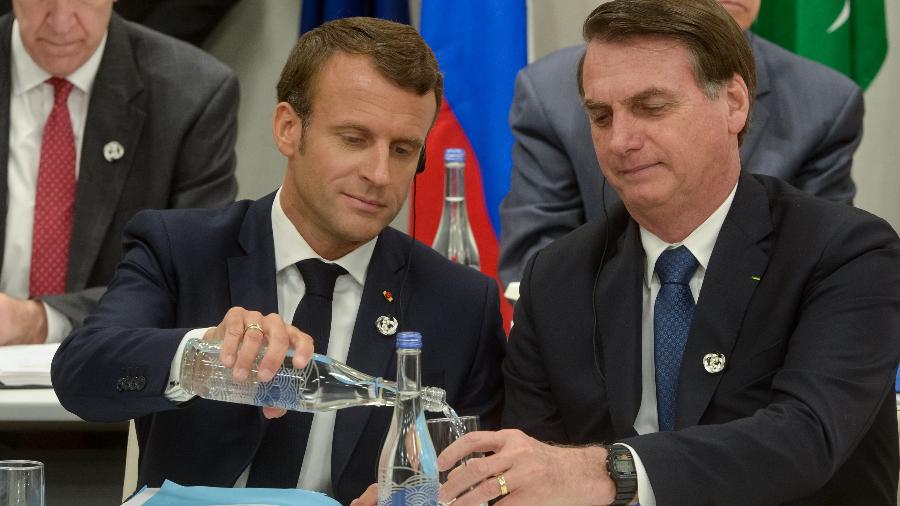RIO DE JANEIRO, BRAZIL – For 75 percent of Brazilians, international interest in the Amazon is legitimate and the forest is at risk. Moreover, in the fight against deforestation and forest fires, Jair Bolsonaro’s government is perceived as poor or very poor by 51 percent of those polled.
These findings are from the Datafolha survey carried out on August 29th and 30th, a week after the start of the crisis involving wildfire outbreaks in the Amazon region, which led Brazil to enter into a collision course with European countries, France in particular.

A total of 2,878 people over the age of 16 were heard in 175 Brazilian cities, and the margin of error is two percentage points up or down.
International involvement in the region, proposed by French President Emmanuel Macron, was the object of some of the questions.
In contrast with the 75 percent who find the interest legitimate, 22 percent disagree with this statement. In addition, 61 percent of respondents feel that other countries are using the environmental crisis as an excuse to exploit the Amazon, compared to 35 percent who disagree.
On the other hand, 66 percent of those interviewed believe that Brazil should accept foreign money to invest in the region.
Throughout the week, France and other countries offered financial aid to the country, but Bolsonaro initially rejected it – afterwards, he implied that he would not accept European funds, while discussing cooperation with the United States and Israel, whose governments he considers ideological allies.
The nationalist approach arises when the question is who should run the region. For 40 percent, the Amazon is solely Brazil’s responsibility, as the government’s official policy preaches. However, 35 percent believe in the country’s sovereignty, but that it should listen to other nations.
Finally, 22 percent of those interviewed by Datafolha believe that an international management plan, as suggested by Macron, would be a good idea.
The clash between Macron and Bolsonaro over the forest was known to 60 percent of respondents, while 40 percent had not heard of the case.

The French presiden is perceived as better prepared to deal with the problem than his Brazilian counter part: (41 percent to 36 percent), more concerned about the Amazon (44 percent to 30 percent); and better prepared to provide solutions to the region (42 percent to 32 percent).
Some 25 percent approve of Bolsonaro’s fight against deforestation and fires, while 21 percent view his administration as fair- in addition to the 51 percent who disapprove of it and 3 percent who say they do not know how to evaluate it.
In this item, Bolsonaro’s management is most criticized on this issue by people between age 16 and 25 (60 percent poor/very poor), people with higher education (56 percent) and those with monthly earnings above ten minimum wages (55 percent).
During the crisis, countries announced that they could review trade agreements such as the one signed by Mercosur and the European Union this year. For 64 percent of respondents, the incident could result in the withdrawal of foreign investment from Brazil, while 32 percent do not believe this will happen.
Bolsonaro’s hostility in dealing with the crisis, particularly evident in his verbal duel with Macron, could lead to the same loss of investment, according to 69 percent of respondents, while 27 percent do not believe this is likely.
Agribusiness, portrayed by environmentalists as the great villain of the Amazon’s destruction, is the concern of 48 percent, while 46 percent disagree with it. Sixty-one percent do not think the sector needs more room to develop, compared to 35 percent who think otherwise.
The change of government has not influenced Brazilians as much as the impact of environmental policies on economic development.
In 2018, Datafolha had asked this question and the answer was that 59 percent rejected economic as likely; now it is 55 percent, a statistical tie.
Unlike assessments of Bolsonaro’s popularity, the survey data show consistency in issues such as regional distribution. The North, an area entirely covered by the Amazon, only falls outside the curve when considering respondents’ answers about foreign intentions to exploit the region: 69 percent think there is such an interest, compared to 61 percent of the total population base.
The awareness that deforestation is increasing in the Amazon, according to INPE’s official data which Bolsonaro challenged, is wide: 71 percent of the respondents believe this, while 21 percent believe that the rate is unchanged and 5 percent believe it is decreasing.
Datafolha was told by 37 percent of respondents that they had recently seen fires in environmental reserve areas, compared to 62 percent that had not seen fires. The number of witnesses is expected to increase in the most affected regions: in the North, 46 percent have seen fires and in the Midwest, 47 percent.
Datafolha also repeated some questions that had been asked in May 2009 under the administration of Luiz Inácio Lula da Silva.
The leftist’s environmental policy was viewed as very good or good by 20 percent, while that of Bolsonaro is regarded as such by 21 percent.

The difference comes in the other categories: 70 percent considered Lula’s as fair, compared to 28 percent for the current president, while 49 percent reject it as poor or very poor; it was only two percent ten years ago.
The decade between research has seen some changes in assessment. In 2009, 63 percent believed that the federal government was very responsible for deforestation in the Amazon. Now, it is 47 percent – and 17 percent today think that the Planalto has no responsibility, compared to 7 percent ten years ago.
Accountability has also decreased for loggers (72 percent to 60 percent), ranchers (68 percent to 53 percent), Indigenous people (38 percent to 26 percent) and NGOs (40 percent to 31 percent), the last two groups being regular targets of Bolsonaro’s speech on culprits for the environmental crisis.

